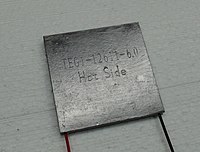
Photo from wikipedia
Abstract Lead telluride is among the best performing thermoelectric materials in an intermediate temperature range up to 750 K. It has thus been widely used for technology development and is still… Click to show full abstract
Abstract Lead telluride is among the best performing thermoelectric materials in an intermediate temperature range up to 750 K. It has thus been widely used for technology development and is still a candidate material for high efficiency thermoelectric generators for space applications. However, its mechanical properties present major difficulties for processing and successful application. Material preparation such as milling and sintering has a great influence on the resulting material properties and can be utilized to optimize material properties. Within this work the influence of powder preparation and sintering temperature on the resulting thermoelectric and mechanical properties of undoped lead telluride (PbTe) is investigated. We find that thermoelectric properties are mainly dominated by formation and healing of lattice defects, whereas mechanical properties are dominated by grain size. Additionally the relevance of residual strain as a consequence of temperature gradients inside samples during sintering is demonstrated.
Journal Title: Materials Research Bulletin
Year Published: 2017
Link to full text (if available)
Share on Social Media: Sign Up to like & get
recommendations!